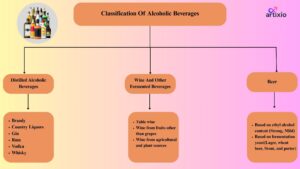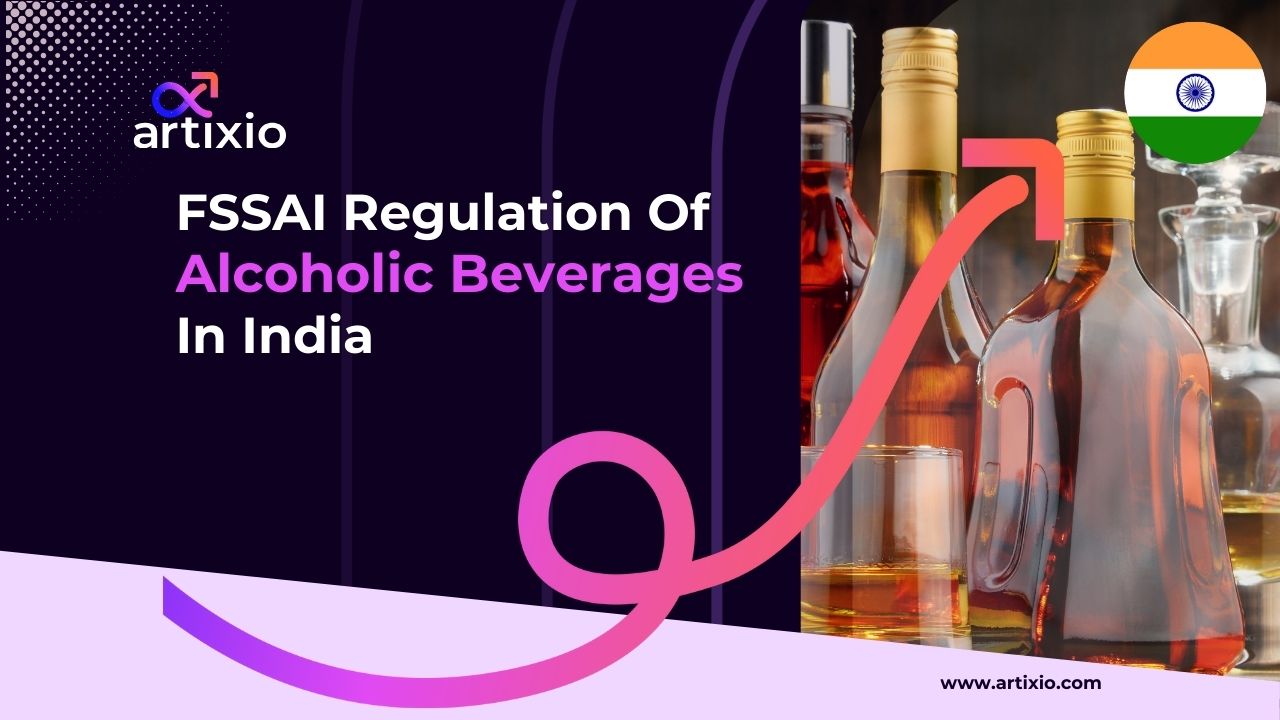India has been known for its rich heritage of alcoholic beverages and in recent years the manufacturing and sale of alcoholic beverages has increased tremendously. The alcoholic beverage is subjected to food and safety standards (alcoholic beverages) regulations, 2018. The alcoholic beverage market is about to reach a sale rate of approximately ₹5.1 trillion (USD 70 billion) by 2026, at an annual growing rate of 7.4% CAGR from 2025 to 2035.
Definition of alcoholic beverages under FSSAI Regulation:
Alcoholic beverages are defined as liquor containing more than 0.5 % alcohol by volume, of which the ethanol used should be of agricultural origin.
Classification of Alcoholic Beverages By FSSAI:

The FSSAI has classified alcoholic beverages mainly into three categories and these three categories are further subdivided into various types of alcoholic beverages. Below is a detailed description of the classification of alcoholic beverages:
1. Distilled Alcoholic Beverages:
This category is further subdivided into various subcategories such as
- Brandy – It is prepared by distillation of wine. It has many varieties such as grape brandy, blended brandy, etc.
- Country liquors – These are manufactured from the distillation of fermented carbohydrates of agricultural origin. Its varieties include plain country liquor, blended country liquor, and fenny.
- Gin – It is made from a neutral spirit of agricultural origin flavored with juniper berries and or other flavoring agents of botanical origin.
- Rum – It is manufactured by utilizing fermented juice of sugarcane, sugarcane molasses, or any other sugarcane product
- Vodka – It is prepared from neutral spirit obtained from the fermented mash of rye, potato, cassava, grains, or any other carbohydrates of agricultural origin.
- Liqueur/Cordial – It is manufactured using distilled spirit of agricultural origin that is flavored with fruit, cream, herbs, spices, essential oils, and products of botanical origin
- Whisky – It is prepared by distilling the fermented extract of malted cereal grains such as corn, rye, and barley, or using neutral grain spirit or rectified grain spirit of agricultural origin. Its types include single malt whiskey, blended malt whiskey, malt or grain whiskey, etc.
2. Wine and Other Fermented Beverages:
Wine and other fermented beverages are further categorized as follows:
Wine is an un-distilled alcoholic beverage produced by the partial or complete alcoholic fermentation of the juice of fresh sound ripe grapes, including grape juice concentrate, restored or unrestored pure condensed grape must, and raisins. Its subcategory includes the following:
- Table wine- There are many types of table wine such as red wine, pink wine, etc.
- Based on Carbon dioxide content- Based on the carbon dioxide content there are different types of wine such as semi-sparkling wine, sparkling wine, carbonated wine, fortified wine, etc.
- Wine from fruits other than grapes- Such types of wines are produced from fruits other than grapes such as cider and perry.
- Wine from agricultural and plant sources- This type of wine is prepared by normal alcoholic fermentation of the juice or sap of other agricultural and plant sources with or without the addition of sugar or jaggery such as bamboo wine, palm wine, etc.
3. Beer:
Beer is defined as a fermented alcoholic beverage made from barley malt or other malted grains, sometimes with added adjuncts like wheat, maize, corn, rice, or other cereal crops that have hops to give a bitter taste and flavor.
It is further divided as:
1. Based on ethyl alcohol content- This category includes
- Regular/mild beer-It has 0.5-0-5.0 abv
- Strong beer-It has 5.0-8.0% abv
- Alcohol-free beer-It has abv 0.0%
2. Based on the fermentation yeast used – This category includes a variety of wines such as lager, ale, wheat beer, stout and porter, and draught beer.
For more details regarding the types of alcoholic beverages and the regulations, visit the official FSSAI website.
FSSAI Alcoholic Beverages Labelling Requirements:
An alcoholic product should follow the general FSSAI labeling guidelines in association with the special alcoholic labeling guidelines laid down by the FSSAI. Following are the labelling FSSAI standards for alcoholic beverages:
- Alcohol content should be declared on the label.
- The label may include a statement of the approximate number of standard drinks in the package as one standard drink contains 12.7 ml of abv as measured at 20°C.
- Imported alcoholic beverages should follow the guidelines as per the Food Safety and Standards (Import) Regulations, 2017.
- No health claim or nutritional information should be mentioned on the label.
- The word non-intoxicating should not be used for products that have more than 0.5 percent abv.
- The wine labeling should comply with the general FSSAI labeling guidelines and the above-mentioned guidelines with some special guidelines. Following are the special labelling FSSAI standards for wine:
– The label should mention the country of origin of wine and the range of sugar in it.
– The label should have the generic name of the grape or fruit used in it in the descending order of its quantity.
– Should have preservatives or additives mentioned on the label.
– The date of vintage should be mentioned if at least 85 percent of the wine comes from that vintage.
FSSAI Alcoholic Beverages Packaging Requirements:
An alcoholic product that intends to be marketed should follow the FSSAI standards for alcoholic beverages for packaging:
- They should be packed in a suitable container as mentioned in the norms.
- Bulk containers should meet the safety parameters and should not have any upper limit on alcohol content.
- Bulk containers should have a label on them mentioning “for the manufacturer of alcoholic beverages only.
- Alcoholic beverages containing not more than 8.0% abv should follow the requirements of Table 1 of regulations.
FSSAI Registration Process For Alcoholic Beverages:
The registration of alcoholic beverages varies from state to state; however, the major process is the same all over India. The alcoholic beverage should register with the FSSAI and apply for state exercise department licensing. The validity of the approval is one year which should be renewed after expiry.
Types Of Licensing For Alcoholic Beverages:
- L6: For retail vendors of beer and Indian liquors.
- L15/L15F: Tourism approval to serve Indian or foreign liquor.
- L19: Approval to serve foreign liquor in clubs.
- L49: Approval for serving liquor at specific premises.
Documents Required For Alcoholic Beverages Regulatory Compliance:
The following documents are required for the alcoholic beverage registration:
- Applicant photo.
- Applicant government ID such as Aadhar card, PAN card, etc.
- Address proof copy of the business activity.
For more details regarding documents, you can visit the FoSCoS website.
FSSAI Regulations For Alcoholic Beverages Advertisement:
The marketing of alcoholic beverages using advertising platforms such as television, newspapers, magazines, etc. is prohibited. Still, some manufacturers use the surrogate advertisement method for promoting their products.
Alcoholic Beverages Prohibited Indian Regions:
- There are certain states and union territories where the sale and consumption of alcohol are prohibited, and such regions are known as “dry regions”.
- States such as Gujrat, Bihar, Mizoram, Nagaland, and Union territories such as Lakshadweep are the dry regions where the sale of alcoholic beverages is prohibited.
Import License Requirement For Alcoholic Beverages:
The import license for alcoholic beverages has the following documentation requirements:
- Business registration and Importer Exporter Code (IEC)
- State exercise department license
- Import standards
- Quality standards documents
Documents Required For Import Of Alcoholic Beverages Regulatory Compliance:
Following is the list of documents required for the alcoholic beverage import:
- Liquor license
- Commercial invoice
- Bill of entry
- Purchase order
- Duty payment receipt
- Import declaration
- Certificate of Analysis
- Bottle labeling, etc.
Custom Duties And Taxes:
An alcoholic beverage is subjected to taxes and customs duties according to the Customs Tariff Act and they are also subjected to GST and state-specific regulations.
Post-Import Compliance India:
To ensure that alcoholic beverages comply with all the regulations after its marketed following key points should be considered:
- Regular auditing and inspection should be carried out.
- Proper documentation should be maintained of post-compliance.
- All alcoholic beverages should continue to follow the norms of FSSAI.
- Any recall or adverse effect should be quickly addressed.
Conclusion:
Alcoholic beverages are seen of many different varieties of which each variety holds different rules and regulations. There should be a strict following of all the norms of FSSAI imposed for the manufacturing and sale of alcoholic beverages to achieve a successfully marketed alcoholic beverage. However, the different rules and guidelines of FSSAI for different kinds of alcoholic beverages can be confusing and it can lead to non-compliance and delayed approval process.
Hence, to ensure timely alcoholic beverage regulatory compliance and prevent delayed approval, partner today with Artixio where our well-experienced staff will ease your whole regulatory process.
Contact Artixio today at info@artixio.com for expert regulatory consultation services.
FAQs:
1. What is the FSSAI alcohol content limit set for alcoholic beverages?
The alcohol limit set by FSSAI is different for different alcoholic products such as for spirits. It should be 35% abv, whereas beer has lower content abv requirements.
2. Can the license of an alcoholic beverage manufacturer be revoked by FSSAI?
Yes, the FSSAI has the authority to revoke or suspend the license upon detection of any non-compliance with the safety and quality standards.
3. How are imported alcoholic beverages with non-complaint labels handled by FSSAI?
The FSSAI has the authority to recall imported alcoholic beverages with non-compliance.
4. How is the safety of raw materials used in alcoholic beverages ensured by the FSSAI?
FSSAI ensures that the raw materials such as grapes, spices, raisins, grains, etc. that are used in the manufacturing of alcoholic beverages meet the safety, standard, and quality criteria.
References:
- https://www.fssai.gov.in/upload/uploadfiles/files/Compendium_Alcoholic_Beverages_Regulations_04_03_2021.pdf
- https://www.fssai.gov.in/upload/uploadfiles/files/Gazette_Notification_Alcoholic_Beverages_05_04_2018.pdf





